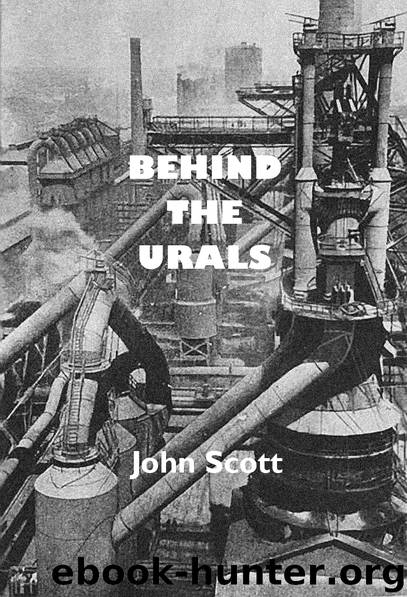Behind the Urals by John Scott

Author:John Scott
Language: eng
Format: epub
PART SIX. The Battle of Iron and Steel
I
During the early thirties the main energies of the Soviet Union went into construction. New plants, mines, whole industries, sprang up all over the country.
All too frequently, however, the new aggregates failed to work normally. Semi-trained workers were unable to operate the complicated machines which had been erected. Equipment was ruined, men were crushed, gassed, and poisoned, money was spent in astronomical quantities. The men were replaced by new ones from the villages, the money was made good by the State in government subsidies, and the materials and supplies were found somehow.
Beginning in 1935, the main energies of the country were transferred from construction to production.
Russia needed enormous amounts of iron, steel, and machinery of all kinds to satisfy the expanding demands of the country's consumers' goods market, and, not less important, for the Red Army, Navy, and Air Force; for guns, munitions, planes, cruisers, and tanks. Every Soviet newspaper, radio program, and public speech emphasized the vital importance of production.
In Magnitogorsk, Zavenyagin turned his attention to the problem of producing iron and steel and coke and ore. He left construction in the hands of subordinates. Production workers' wages became higher than those of the builders; the press, supply organizations, the party, all turned their eyes toward production. I had worked three years welding blast furnaces and climbing structural steel. I decided to go over to production.
My graduation from the Komvuz was a contributing factor in this decision. After being ceremoniously graduated, I was urged by local party authorities to go into propaganda work. However, as I showed no inclination either to join the Communist Party or to renounce my American citizenship — steps necessary for anyone to become a party functionary in the Soviet Union — the party authorities found it necessary to tell me what no employment of a political nature was open to me.
I was very glad. I had learned a great deal in the Komvuz — my Russian was good and I had a clear idea of the theories of Marx, Lenin, and Stalin, upon which the social and economic structure of the Soviet Union was presumably based. I knew all the answers, or at least most of them, and could enumerate the errors and infamies of the Trotzkyite and several other oppositionary groups with a speed and accuracy which made my teachers smile with pride.
But to become a professional propagandist I had no desire. It is all very well to be taught things one does not believe or accepts with reservations; it is quite a different matter to teach these things to others. I wanted to study sciences which I could accept more fully, learn lessons I could master and repeat without any feeling of intellectual hypocrisy. I wanted to go to engineering school. Magnitogorsk boasted but one such — the Mining and Metallurgical Institute — entry to which was open only to production workers in the mill.
After a great deal of difficulty the Construction Trust accepted my resignation as of the termination of a six weeks' vacation.
Download
This site does not store any files on its server. We only index and link to content provided by other sites. Please contact the content providers to delete copyright contents if any and email us, we'll remove relevant links or contents immediately.
| Africa | Asia |
| Canadian | Europe |
| Holocaust | Latin America |
| Middle East | United States |
Fanny Burney by Claire Harman(25790)
Empire of the Sikhs by Patwant Singh(22177)
Out of India by Michael Foss(16313)
Leonardo da Vinci by Walter Isaacson(11913)
Small Great Things by Jodi Picoult(6105)
The Six Wives Of Henry VIII (WOMEN IN HISTORY) by Fraser Antonia(4797)
The Wind in My Hair by Masih Alinejad(4427)
The Lonely City by Olivia Laing(4122)
The Crown by Robert Lacey(4111)
A Higher Loyalty: Truth, Lies, and Leadership by James Comey(4038)
The Iron Duke by The Iron Duke(3649)
Millionaire: The Philanderer, Gambler, and Duelist Who Invented Modern Finance by Janet Gleeson(3574)
Sticky Fingers by Joe Hagan(3456)
Alive: The Story of the Andes Survivors by Piers Paul Read(3317)
Papillon (English) by Henri Charrière(3276)
Joan of Arc by Mary Gordon(3263)
Stalin by Stephen Kotkin(3089)
Aleister Crowley: The Biography by Tobias Churton(3024)
Ants Among Elephants by Sujatha Gidla(2927)
